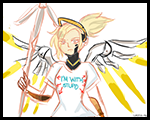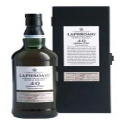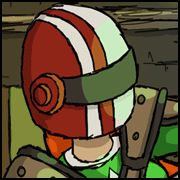|
Sometimes if a roll is like within one of the target, I'll give that bonus +1 if they manage to describe their actions in a cool way or fudge it if it's a super cool power. But that's just because I DM like a cheerleader. I want to see the players do cool stuff. But the systems I play don't make me do that to keep the party alive. I just do it for coolness.
|
|
|
|

|
| # ? May 30, 2024 18:54 |
|
Kitchner posted:No, I'm saying that the fact you occasionally would have to in order to keep the game interesting or the story flowing isn't a rules failure, because it happens in every RPG. This has been mentioned, but it bears repeating. The statement you have made here is utterly untrue. It may be necessary in 5E - and arguably some other versions of D&D - it's certainly not true of many RPGs.
|
|
|
|
So, was reading over the PHB with a friend who's looking to get into 5e and we were looking at the Warlock's Pact Magic, and how it says "you regain your expended spell slots after a short or long rest." Then he asked me if that included spell slots from multiclassing. Obviously any sane DM/table would say "no," but there's not really anything I could find (in the phb at least) that concretely says that feature of Pact Magic doesn't apply to spell slots you get from other sources. Can someone point me at some text that clarifies this? I mean I get that it's a dumb reading, but I'm curious if there's anything besides common sense that kills it.
|
|
|
|
I'm fairly sure it's one of the special circumstances mentioned in the multiclassing rules.
|
|
|
|
goatface posted:I'm fairly sure it's one of the special circumstances mentioned in the multiclassing rules. All it says is you can use the spell slots from both the Spellcasting and Pact Magic features to cast whatever spells you have access to.
|
|
|
|
Isn't there something about only recovering the equivalent warlock slots? I'm sure I remember reading that.
|
|
|
|
Generic Octopus posted:So, was reading over the PHB with a friend who's looking to get into 5e and we were looking at the Warlock's Pact Magic, and how it says "you regain your expended spell slots after a short or long rest." Then he asked me if that included spell slots from multiclassing. Obviously any sane DM/table would say "no," but there's not really anything I could find (in the phb at least) that concretely says that feature of Pact Magic doesn't apply to spell slots you get from other sources. Page 164 of the rulebook quote:You determine what spells you know and can prepare for each class individually, as if you were a single-classed member of that class. Which seems to imply that you prepare spells for each class individually so your warlock ability makes you regain your warlock slots, not your others. The bit on the same page about pact magic just says you can use the pact spell slots for other spells, which has nothing to do with when the slots recharge. e: Also, if I'm understanding this correctly, your Warlock stuff explicitly isn't affected by the "Spell Slots" subsection of that page... because a Warlock's spellcasting is "Pact Magic" and not "Spellcasting". Elector_Nerdlingen fucked around with this message at 14:33 on Feb 9, 2015 |
|
|
|
AlphaDog posted:Page 164 of the rulebook Right. The features don't have you prepare spell slots though, you just prepare spells (and some casters don't even do that). Spell slots themselves are just expended/regained, was my understanding. Generic Octopus fucked around with this message at 14:33 on Feb 9, 2015 |
|
|
|
Generic Octopus posted:Right. The features don't have you prepare spell slots though, you just prepare spells (and some casters don't even do that). Spell slots themselves are just expended/regained, was my understanding. See my edit. I'd assume that the warlock's Pact Magic works on completely different rules from every other spell casting class, as shown by the ability name being "Pact Magic" and not "Spellcasting" like on everything else (which I only just noticed). This is also implied by the "spell slots" section under multiclassing where every single spell casting class except the Warlock* is called out by name. My new answer is "hell if I even know". *Or to put it Natural LanguageTM, every single spellcasting class. Because the warlock doesn't have spellcasting. It has pact magic. Which it uses to cast spells. Which isn't the same thing as spellcasting. Elector_Nerdlingen fucked around with this message at 14:41 on Feb 9, 2015 |
|
|
|
This is one of the occasions where I'd use 5E's purported "rulings not rules" and "power back to the DM" aspects and just lay down that for the game you're playing, Short Rests will only recharge spell slots from your Warlock class.
|
|
|
|
gradenko_2000 posted:This is one of the occasions where I'd use 5E's purported "rulings not rules" and "power back to the DM" aspects and just lay down that for the game you're playing, Short Rests will only recharge spell slots from your Warlock class. Yeah I agree. Was just pointing out a case of the text confusing me & a friend. AlphaDog posted:See my edit. I'd assume that the warlock's Pact Magic works on completely different rules from every other spell casting class, as shown by the ability name being "Pact Magic" and not "Spellcasting" like on everything else (which I only just noticed). This is also implied by the "spell slots" section under multiclassing where every single spell casting class except the Warlock is called out by name. I'm just chalking it up to a lack of clear definition of how spells slots work, but there's loads of ways to write those parts besides "You regain all expended spell slots..." that would clarify it. "You regain these spell slots..." is the easiest I can think of. Generic Octopus fucked around with this message at 14:50 on Feb 9, 2015 |
|
|
|
Generic Octopus posted:I'm just chalking it up to a lack of clear definition of how spells slots work, but there's loads of ways to write those parts besides "You regain all expended spell slots..." that would clarify it. "You regain these spell slots..." is the easiest I can think of. Yeah, for sure. I'm also wondering if there are any more weird things that crop up because of the Warlock's casting having a different name.
|
|
|
|
30.5 Days posted:I honestly can't think of any RPG that has been recommended in this thread- 4th ed, 13th age, dungeon world, FATE, that that would be true for. And I know that of the three individuals who have posted their own rulesets, all 3 would consider that as a design failure on their parts. So which RPGs other than D&D can you definitively state that fudged rolls are a necessary part of running a game? D&D, all of the Warhammer and 40K RPGs, Judge Dredd, the Star Wars RPG and some others that I can't remember the system for right now (maybe Paranoia?) . Just just to be doubly clear, my points are: 1) DMs will always have to make a choice to play their monsters in character, and if they don't it's not the rules fault. No amount of rules can stop the DM from doing poo poo that's dumb with their NPCs and the original example was a bad DM not bad zombie rules. 2) That the system is not poo poo as an RPG system just because the DM occasionally has to fudge things or somehow not play by the rules in order to make things more fun, make more sense, whatever. It's a common theme in all RPGs I've ever played, and every group has been aware of this. All these points about "well my group has never fudged rolls" are pointless. I couldn't give a poo poo what you and your group do. If you are all happy playing RAW no matter what and letting the DM use every out of character trick they can to kill you using MM creatures only and you have fun doing so, then go loving nuts. What I'm saying is the original complaint that the DM's zombies were unzombie like was the fault of the DM not the rules, and calling an RPG system that tells the DM to sometimes ignore the rules poo poo is dumb, because I've played plenty of RPGs where this is the same, and in plenty of groups where this is expected. There are plenty of valid criticisms of DnD but the fact that hypothetically the DM needs to occasionally fudge some stuff on the fly or ignore some rules isn't one of them. If you don't like that style there isn't an RPG I can personally recommend to you.
|
|
|
|
Kitchner posted:
Whose fault is it that D&D has the potential for players to never actually find a dungeon because of binary pass/fail?
|
|
|
|
And here I was, foolishly thinking I could spark a discussion of the West Marches.
|
|
|
|
I like the idea of the West Marches. Just investigating the wilderness at the whim of the players. It's the sort of thing that the theory behind 5th makes sense for. No repository of powerful trinkets and overpowered mage-smiths in the huge cities, if you want a magical thing you follow up a lead from an ancient poem to find one. I imagine it would need a lot of initial work to generate the basic elements. The insular, safe town that can provide a lot, but not everything, the key landmarks and the basic layout of the region with level appropriate random encounter tables, a whole sack of adventure hooks. I'd quite like to try running it, but I'd need to have a solid look at the currently available beasts and (semi)natural foes in the Bestiary, see how the level scaling actually sits up and if there's enough variety to keep things interesting.
|
|
|
|
moths posted:Whose fault is it that D&D has the potential for players to never actually find a dungeon because of binary pass/fail? "The user should always be blamed — D&D games happen in a verisimilitudinous milieu, therefore common sense. If the DM lacks that, they aren't the kind of übernerd this hobby needs. What is 'usability' and why should we dumb our Imagination Tomes (only a Phylistine would describe RPG books as 'instruction books') in order to pander to the mundanes/dirty casuals?"
|
|
|
|
goatface posted:I like the idea of the West Marches. Just investigating the wilderness at the whim of the players. It's the sort of thing that the theory behind 5th makes sense for. No repository of powerful trinkets and overpowered mage-smiths in the huge cities, if you want a magical thing you follow up a lead from an ancient poem to find one. Honestly, a lot of that is on the players. Right now we have 2 DMs, with a third and his group coming soon. We generated about a half dozen hooks, mostly at random with no idea what would happen. Then, if one got picked, the DM would prepare for that session. We didn't seed the wilderness ahead of time, we build the safe zone, and a little bit of a map around it and let players adventure. Last session, they wanted to trek towards a volcano in search of a dragon (they're a lvl 3ish party, so way to punch up!), so I planned 3 or 4 set pieces they'd come across, and a few random encounters and just rolled along with them. Plus, while the starting goal was "go west, young man", I ended up seeding a port town nearby that has three factions locked in a cold war, and that's generated a good bit of interest, so my sessions that get ran in that area (as in, if players choose to explore Landow and the factions) will be less wilderness and more intrigue. The other DM is very wilderness, hexcrawl focused, so tends to set those sorts of hooks. So far it's working great, we're getting some players who just seem along for the ride, and we wish that more would be active, helping flesh out wiki pages, crafting their own rumors, etc, but so far it's going well. I don't know how much is visible, but here's our Obsidian Portal if you want to check out the land, adventure logs, notice board and stuff: https://thewestmarches.obsidianportal.com/ Elendil004 fucked around with this message at 16:57 on Feb 9, 2015 |
|
|
|
moths posted:Whose fault is it that D&D has the potential for players to never actually find a dungeon because of binary pass/fail? The DM because it doesn't unless the DM chooses to make it so. Possible solutions right out of the DMG: 1) Don't rely on a skill check to locate the dungeon. Instead have players roleplaying how they would find it. 2) If the player fails the check but there's nothing to stop them re-attempting the roll (which there isnt) say they automatically succeed but it takes them 10 times as long to do it. 3) Optional rule of saying if the test was DC10 and they roll 8 or something close you instead say they succeed with consequences. If them finding the dungeon is essential to the story line or the key focus point of three sessions worth of content, I'd advise you to do one or two. This isn't even me house ruling anything, these are all in the DnD books. Nancy_Noxious posted:"The user should always be blamed — D&D games happen in a verisimilitudinous milieu, therefore common sense. If the DM lacks that, they aren't the kind of übernerd this hobby needs. What is 'usability' and why should we dumb our Imagination Tomes (only a Phylistine would describe RPG books as 'instruction books') in order to pander to the mundanes/dirty casuals?" Or you know if you're the DM you could just read the DMG which tells you exactly what to do in three different ways to stop the scenario from happening. Kitchner fucked around with this message at 20:35 on Feb 9, 2015 |
|
|
|
I would definitely run D&D West Marches-style once I finally get some time to game again. There's a lot of material for it, it lends itself to 'lazy DMing' and large parts of the game are built for it. That was kind of how I was running games already before: 4 different sessions of B/X and 5E that were supposedly one-shots were actually set in the same 'universe' and I just progressed the plot a little more with every group of randos that jumped in with me.
|
|
|
|
Elendil004 posted:I don't know how much is visible, but here's our Obsidian Portal if you want to check out the land, adventure logs, notice board and stuff: https://thewestmarches.obsidianportal.com/ I can see most of it. Looks good, I like the map. If I can ask a few questions: Were the volcanoes there from the start, a result of top-of-the-head rumours, declared by the players? What do you do if they're currently halfway through a dungeon in a session that runs out of time? Do all DMs know what the other DMs are doing?
|
|
|
|
It's the fault of the DM that he is playing zombies like a squad of marines and ignoring the monster manual suggestions. But its the fault of the rules that this is not only possible but effective. 4E Kobolds can shift as a minor action. This allows them to get out of attack of opportunity range, flank without penalties or risk of counter, slip through a defender's fingertips, and get out of dodge between ambushes. This one ability clearly makes the best option to play Kobolds as crafty little buggers who come out of nowhere, evade or surround the big guys, and get the hell out when the fight goes bad. In a direct charge they would simply be pummeled. An orc, instead, gets to attack and heal once bloodied. This lets them desperately try to stay in the battle, encourages a fight over a retreat,and emphasizes their role as brutal frontline fighters. Play the kobold as the orc and he ends up a smear on the pavement. Play the orc as the kobold and he gets cut down by opportunity attacks as he tries to flee or creep towards the wizard. This is what AlphaDog means. Also by giving players actual defensive options, reliable yet limited healing, and an actual pool of hp, you stop having to pull punches on traps and encounters.
|
|
|
|
So now that I've actually played it some more, I feel 5e does a good job of capturing what it felt like to play AD&D when the DM didn't let you break it with trivial access to magic items: healing is scarcer, combat (martial and magical) is boring, and the rest of the game is about building up as much advantage as possible in advance of a fight, or avoiding fights entirely. Not only are spells the game's list of mechanical effects, they are the list of the optimal ways of circumventing all of the game's challenges. I know this is nothing new to this thread. On the one hand, it's nice that they did recapture the feeling of the old games with some modern design. On the other hand, I think there's still the expectation that adventures are a series of fights, so for the most part, the game is about a series of things that you want to rush through or avoid entirely. The default of rolling for hit points and healing is shockingly terrible, though, where healing is already scarce. If I wanted to play Wounded Party Campsite Simulator 5000, ... well, I can see how that could actually be more fun than 5e at times, if it were played like Dread.
|
|
|
|
ProfessorCirno posted:It does say "give lower DCs to people with higher skills to reduce their chance of failure." Bounded Accuracy strikes again!
|
|
|
|
The Bee posted:It's the fault of the DM that he is playing zombies like a squad of marines and ignoring the monster manual suggestions. But its the fault of the rules that this is not only possible but effective. Yeah, this is a key part of what made 4e's monster design great and what makes 5e's bent as gently caress - in 4e the mechanics were carefully considered to support the monster's described tactics -- kobolds are shifty and quick, orcs are tough, bashy and keep swinging, goblins are tricksy and cunning and hard pin down, hobgoblins are phalanx soldiers - so they gave them abilities when emphasised those things. Kobolds are quick and shifty - they can shift as a minor action which means they can potentially start their turn in a melee, and end their turn hitting the wizard 60 feet away (shift/move/charge). Orcs are tough and keep swinging - they get some form of healing attack when they're damaged, or if they're minions they get a free swing when you knock them over. Hobgoblins are phalanx soldiers - they get extra AC, and maybe damage or CA when they have allies adjacent. Goblins are cunning and hard to pin down - they get a free shift if you miss them - and critically, this feels very different from Kobolds - Kobolds are relatively easy to hit, but hard to stop from getting away on their turn. Goblins are the opposite, easy to hold on to, but hard to keep in the middle of a melee. Four different sorts of 'HP and bash' type mook races, given very different, very thematic feels with very simple, carefully considered mechanics. Whereas in 5e you got things like Hobgoblins being given extra damage or advantage when any ally is next to the target - which far from making them phalanx soldiers, givens them significant tactical advantages to having a single ally go stand next to their target like a beacon and the hobgoblins snipe from different parts of the map with extra damage, and not gang together at all because that's a great way to all get fireballed for no benefit, or orcs who get a bonus action to move towards the target - but instead of being in-your-face melee bashers, they wind up being hit and run artists, because the free move TOWARDS the enemy gives them their normal move to get away again. The mechanics just weren't considered (or more likely, properly playtested) in terms of what they actually DO in practice, they were just tossed at a wall in the hope they'd stick.
|
|
|
|
BatteredFeltFedora posted:Bounded Accuracy strikes again! Yeah the big problem with skills is that the best advice is "if there shouldn't be a chance of failure/nothing interesting will happen on a failure, don't bother rolling" because the d20 is just too swingy. Like, if you have Guidance and Advantage and Proficiency and you're using a skill keyed off your highest stat, probably don't roll; you should probably succeed, but where's the benefit to having the chance of failure?
|
|
|
|
I've run a number of systems without having to resort to fudging die rolls. These days I make all of my rolls in the open, or alternately run systems where the players roll all the dice (including damage rolls on their characters). It's working out pretty great. The key to doing is to run games that don't actively require you to ignore their rules to protect your players or because the rules produce lovely outcomes. Seriously, if you think the GM having to ignore rules and fudge rolls is the norm in RPGs and not an aberration, I suggest you try some better games.
|
|
|
|
thespaceinvader posted:Yeah, this is a key part of what made 4e's monster design great and what makes 5e's bent as gently caress - in 4e the mechanics were carefully considered to support the monster's described tactics -- kobolds are shifty and quick, orcs are tough, bashy and keep swinging, goblins are tricksy and cunning and hard pin down, hobgoblins are phalanx soldiers - so they gave them abilities when emphasised those things. Kobolds are quick and shifty - they can shift as a minor action which means they can potentially start their turn in a melee, and end their turn hitting the wizard 60 feet away (shift/move/charge). Orcs are tough and keep swinging - they get some form of healing attack when they're damaged, or if they're minions they get a free swing when you knock them over. Hobgoblins are phalanx soldiers - they get extra AC, and maybe damage or CA when they have allies adjacent. Goblins are cunning and hard to pin down - they get a free shift if you miss them - and critically, this feels very different from Kobolds - Kobolds are relatively easy to hit, but hard to stop from getting away on their turn. Goblins are the opposite, easy to hold on to, but hard to keep in the middle of a melee. Four different sorts of 'HP and bash' type mook races, given very different, very thematic feels with very simple, carefully considered mechanics. Yeah, exactly. I give 5e credit for at least trying, because 3.5 era sacks of meat need to be gone. But when the abilities clash so badly it becomes clear the developers weren't sure what they were doing. It helps that 4e has abilities that are not only useful but versatile. A kobold with a crossbow and a kobold with a knife have the same ability, but one uses it to retreat and the other uses it to charge. An orc might use its ability to go for desperate damage or just to hold the line. You can make them part of the racial identity without making one trick ponies, even if some limitations are present.
|
|
|
|
goatface posted:I can see most of it. Looks good, I like the map. The volcanos were there, so far (we're about 6 sessions in, with a mixed bag of players) the players haven't really gotten the idea that they can literally create mountains and forests, but they're getting there. Generally the DM designs a session to not leave a party stranded mid game, but we figure for long hooks or things like that, you'd lock that party in and lock the players into the next session. Most players have two PCs anyways (to facilitate corpse runs for dead PCs) so if Bilbo was off in a dungeon, Frodo could do something else. But, we try to avoid mulit-real-world-day adventures, and stick to essentially one-shots that flesh out the world and drive any given narrative in dribs and drabs.
|
|
|
|
The Bee posted:It's the fault of the DM that he is playing zombies like a squad of marines and ignoring the monster manual suggestions. But its the fault of the rules that this is not only possible but effective. I understand what he means, I just disagree. You give me the stats and rules for a 4e Kobold without me knowing what it is and all I'm going to see is something thats good at ambushing and fast. You give me the rules for a 4e orc and all I'm going to see is some sort of character that gets to heal in combat. The context for these creatures matters. If I just picked a random game that you've never played before, picked a monster and told you to fight as that monster would fight without you knowing anything about it you'd struggle. Take the Orc for example. Yeah he's good at fighting in combat and it looks like they prefer to be on the offensive. However do I know if they like to ambush people? If they are an aggressive creature or not? No, because it's not in the stat line. How about if some guy is fighting one orc, and I get that orc to disengage and move back, while another, fresh, orc then charges forward and attacks. Is that something Orcs do? I don't feel like it is, but how can you stop me? Even if it was some how, it doesn't solve the problem that the DM can just say "OK well all the Orcs attack the healer straight away, barrelling everyone else out of the way". Yeah I could probably think of some reason why in some single instance they do this, but it's not going to be a good explanation. There's no rule set in the world that will stop people playing monsters "wrong" without being so prohibitive that you can't play anything else. I don't accept you can ever write a series of rules for any creature where someone who is "playing to win the fight" as he put it, can't pull off some bullshit. The more you blame "bad rules" for this poo poo the more you are basically forgiving bad DMs instead of saying "Yeah you know what, sounds like your group needs to talk to that guy". If you enjoy playing a game where the DM doesn't need to change anything, and they can basically play a tabletop game against the players with the full intention to "win" the combat (presumably by killing the party, which I don't class as a win personally) then go for it. This system in't designed like that though, it's specifically designed for the DM to change some things, fudge some more things, and make stuff up on the fly if needed. If you don't like that then fine, play a different game which can be played DM vs the Players or whatever which apparently many of you do. However, all the systems I've played have essentially said "The DM/GM will occasionally do stuff differently from the rules and this is OK as long as it's fun". I mean the 40K ones even have a box to separate it out and inform everyone that whatever the GM says over rules anything the rulebook says. That doesn't mean it's a bad system, it just means it isn't designed to do what some people are expecting or wanting here, which doesn't make it poo poo. (Which by the way means while I'm open for suggestions as to what cool RPG systems are out there that I haven't tried, it doesn't mean you need to "save me" from these clearly inferior systems I've played or anything, I thought they were all good in different ways and all of them fun).
|
|
|
|
That there is no Defender role (or dedicated Controller) for players to protect the healer with anymore is regrettable and part of how it's possible for an adversarial DM to "pull off some bullshit"
|
|
|
|
Kitchner posted:If I just picked a random game that you've never played before, picked a monster and told you to fight as that monster would fight without you knowing anything about it you'd struggle. Take the Orc for example. Yeah he's good at fighting in combat and it looks like they prefer to be on the offensive. However do I know if they like to ambush people? If they are an aggressive creature or not? No, because it's not in the stat line. Well if you sit down and actually read the stat block for your basic Monster Vault orc warrior it sort of does inform you what sort of creature the orc is and how it fights, that's sort of the point. Are they aggressive? The fact that they get both bonus move speed and a significant bonus chunk of damage (+2 squares and +5 damage respectively) on a charge strongly indicates "hey, you should charge someone," then the Hacking Frenzy ability they get lets them attack everyone around them, so I don't know but I feel like all of this strongly indicates an enemy that's best employed by barreling into the middle of a bunch of people, hitting someone hard, then proceeding to start laying into people left and right. The fact that they also get a free spiteful action upon dying (Savage Demise) sort of ties into that by saying "hey it's okay if this guy gets surrounded and dies, he can try to take someone with him." Alternately it means that if the players are smart enough to try and deal with them at range then guess what, they get to make a free charge attempt (with bonus speed, with bonus damage) upon death so, yeah, the whole statline is in fact a bunch of things telling you THESE GUYS ARE AGGRESSIVE AND LIKE TO SMASH poo poo UP. Do they like to ambush people? Well everybody likes to ambush people. Are they any good at it? Doesn't look like it. Again, you can pick that up by reading the stat line, it's all right there and fairly easy to parse. Kai Tave fucked around with this message at 21:20 on Feb 9, 2015 |
|
|
|
thespaceinvader posted:Whereas in 5e you got things like Hobgoblins being given extra damage or advantage when any ally is next to the target - which far from making them phalanx soldiers, givens them significant tactical advantages to having a single ally go stand next to their target like a beacon and the hobgoblins snipe from different parts of the map with extra damage, and not gang together at all because that's a great way to all get fireballed for no benefit, or orcs who get a bonus action to move towards the target - but instead of being in-your-face melee bashers, they wind up being hit and run artists, because the free move TOWARDS the enemy gives them their normal move to get away again. The mechanics just weren't considered (or more likely, properly playtested) in terms of what they actually DO in practice, they were just tossed at a wall in the hope they'd stick. But at least they tried with the hobgoblin, right? I think the crying shame is that for most of the monsters in the MM, they didn't even try.
|
|
|
|
Kitchner posted:Even if it was some how, it doesn't solve the problem that the DM can just say "OK well all the Orcs attack the healer straight away, barrelling everyone else out of the way". Yeah I could probably think of some reason why in some single instance they do this, but it's not going to be a good explanation. There's no rule set in the world that will stop people playing monsters "wrong" without being so prohibitive that you can't play anything else. This is where the soft tanking mechanics from a few hundred pages ago come into play. Play emerges as a function of rules, and the rules mechanically reinforce narrative. I think more than anything this highlights Next's regression. Most things in 4e were designed to work in the context of other things in 4e. Kobolds could slip past the cleric's bodyguard, those clever pricks! And the DM rarely had to fudge rolls, pull punches, or "roleplay" monsters as idiots because the game's default assumption was that monsters are going for the throat. And player characters were given the tools to deal with it. And now that's all been replaced with this half-assed "zombies shouldn't use tactics or you're a bad DM!" and "everything attacks the fighter and not the guy in a bathrobe!" bullshit. The last edition was designed as a cohesive game, while this is a lazy scrapbook of nostalgic mechanics that relies on the DM to hold it together. It's legit frustrating to see it ballyhooed as some groundbreaking marvel of design, or even passed off as "acceptable."
|
|
|
|
homullus posted:On the one hand, it's nice that they did recapture the feeling of the old games with some modern design. On the other hand, I think there's still the expectation that adventures are a series of fights, so for the most part, the game is about a series of things that you want to rush through or avoid entirely. My play experience seems to parallel your own - this definitely evokes feelings of playing 3.0 back in early high school. On the other hand, I don't really see much modern design here. Just a whole lot of stuff that wasn't even particularly novel in 2002 being reshipped for $150 in 2015.
|
|
|
|
IT BEGINS posted:My play experience seems to parallel your own - this definitely evokes feelings of playing 3.0 back in early high school. On the other hand, I don't really see much modern design here. Just a whole lot of stuff that wasn't even particularly novel in 2002 being reshipped for $150 in 2015. One subtle thing that may not have been intended is a Valor Bard can only give his Bardic Inspiration to increase player d20 rolls, so a wizard's AoE that's just enemy saving throws can't be modified. Not valorous enough, perhaps? I think the lair actions are modern, too.
|
|
|
|
The problem is that Team PC intends to survive. Team Monster has effectively unlimited numbers, and don't care if they die. So a dick GM is going to pull off suicidal poo poo to focus fire down a PC.
|
|
|
|
Sanglorian posted:But at least they tried with the hobgoblin, right? I think the crying shame is that for most of the monsters in the MM, they didn't even try. I'd say they took a step forward with it, but they already TOOK that step in 4e, and failed miserably to learn from it. It's a step forward from 3e, but at least two back from 4e.
|
|
|
|
Regarding fudging die rolls: My belief for any game system is that you should never need to fudge a die roll. Because: 1) You shouldn't be rolling dice at all, or 2) When you are using the game system's random number generation system, all outcomes should be equally interesting and compelling to explore. If a game system fails at informing the DM and players as to when not to roll the dice and just narrate it, the materials on how to play the game are lacking. This idea needs to be disseminated across the text, and ideally, supported by game mechanics. It should not just be in the DMG, it should be in the intro to the PHB. The reason it is not is because D&D is a basically paternal game stuck in the 1970s. The DM is the parents and the players are the children, and the DM's rule is law. Guess what? This does a lot of bad things to how people engage in their Magical Tea Parties. Its pernicious. Problems: Some players and DMs see the dice as an impartial arbiter of reality. If you don't roll it, it lacks validity. This feeling stems directly from the arbitrary nature of DM fiat and the fact that the players and DM are not actually engaging any mechanical game elements when it occurs. Solutions: You can do two things. You can increase player narrative control, which spreads the ability to declare narrative elements across the gaming group, and you can create a game mechanic related to the usage of this. Guess what Compels and Fate Points are? Literally this mechanic. This problem has been solved in other game systems in a variety of clever and interesting ways. D&D is the only laggard. Laphroaig fucked around with this message at 22:24 on Feb 9, 2015 |
|
|
|

|
| # ? May 30, 2024 18:54 |
|
Kitchner posted:All these points about "well my group has never fudged rolls" are pointless. This is kind of a wacky thing to say when your subjective experience is in the minority, as far as the argument goes. Like, nobody else in the thread debating with you seems to be pro-fudging; it's just you and your's, and you're now arguing that everyone else's subjective experiences don't matter, only your's. Your's is the real one, our's is "pointless." You have seen Sasquatch, and are telling us the number of Sasquatches that we or anyone else hasn't seen is irrelevant. Plenty of books cite doing things outside the rules or making up new rules to keep it fresh, yes. Never in my life have I seen a book say "sometimes the DM has to roll one thing and tell the players something totally different, it is absolutely necessary." I don't think Rule Zero is "sometimes the DM has to ignore a rule or lie about a dice turnover or the campaign ends." quote:It's a common theme in all RPGs I've ever played, and every group has been aware of this. It's cool that you're doubling down on this, though, and now it's not just a sidenote in some of the books but a common theme. That's very brave of you in the face of all this adversity. Like, I see where you're coming from. In highschool, when I only played 3.5 and D20 Cthulhu, I fudged dice all the time and thought it was perfectly normal. No book taught me that, though, and no book encouraged it; I did it as a natural response to bullshit player deaths from an unhinged system, and I can't imagine trying to argue that it the DM's Guide totes told me to lie about dice results to the players. I stopped fudging dice the second I picked up, uh, anything else, and deaths started feeling earned/deserved/avoidable. At that point, you're cheating your players out of part of their experience by holding their hand and pretending the bad poo poo never happened. You can still tell a good story from bad poo poo happening. Again, I'm not sure how you would handle any of the games where the PCs have their own preset DCs, or the DCs are static, and the DM has no dice to fudge at all. You roll dice to see outcomes, if you ignore the outcomes then there's no reason to roll the dice. You keep suggesting that other people try board games; I'm going to suggest, in turn, that you might really enjoy LARPing or story games.
|
|
|





























